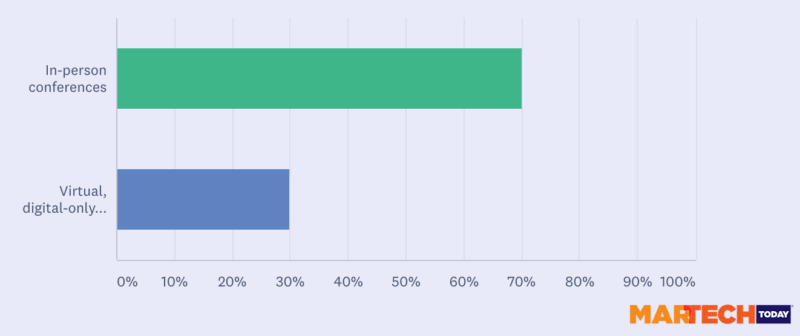Marketers say COVID vaccines create hope for quick return of in-person events
But whether organizers can safely get conferences up and running in 2021 is another question altogether.

“We can’t wait to come back,” says Michael Bartholow about attending in-person conferences. “It’s really one of the best parts of a lot of our jobs.”
But asked when he will feel safe to attend events, the marketing and education director at digital experience agency Bounteous is far less certain.
“A few marketing events in the industry are really excited to get back together in May of this year, and that seems really optimistic to me.”
With COVID-19 vaccinations underway globally and throughout the United States, marketers are indeed seeing an end to conditions that have made business travel to training seminars, conferences and trade shows unsafe. Caution is still reigning in the short term, but optimism is painting their longer-term views.
Nearly 75% of marketers we surveyed in the beginning of 2021 said it was highly unlikely they would attend in-person events in the first half of the year. But that dropped to about 20% when asked about the second half. In fact, 20% of the nearly 200 marketers polled said they felt there was a 5-in-10 chance they would feel safe to travel to events. Even more surprising, 15% of the group said it was “extremely likely.”
That confidence is likely tied to how much comfort the vaccine brings. About 78% of those we surveyed in this latest Events Participation Index said they plan to get vaccinated. Others said they were unsure and only 6% said they would not get vaccinated. Of those who said they would get vaccinated, 13% said they would feel safe immediately (assuming that means after the 2nd booster), 37% said they would feel safe after a month and 29% said they would feel safe after 6 months.
Related: No in-person events until 2nd half of 2021, marketers say
For 2021, then, it’s a question of timing. U.S. President Joe Biden last week said the federal government intended to buy 200 million doses of COVID-19 vaccines, enough to vaccinate most of the U.S. population by summer. Based on the confidence shown in our data, it’s not unrealistic to think attendees would be ready to attend conferences in the fourth quarter if that vaccination schedule holds up.
“In-person lets you meet someone, help them out, maybe save them thousands of dollars in their Google Ads account in one day,” said Bartholow, whose company hosted in-person training events in many cities before the pandemic. “It’s harder to do all those things online, and impossible to do some of them.”

Embracing the ‘big pivot’
Despite the endorsement, Bartholow still thinks 2021 is going to be an all-virtual year for events hosted by Bounteous. The company has already invested in the infrastructure and execution of virtual training sessions. And like most organizations that jumped into virtual events last year, it made changes in how they run events.
“A full eight hours online is a really tough time for everybody. And it was tough for our trainers. So we shortened it down to the five hours that are the most necessary content pieces,” said Bartholow. “We redid and updated a lot of content. And we brought in a lot of new trainers as well, because suddenly our senior folks were needed for huge client projects or rescuing somebody’s ad budget.“
Bartholow said the pivot has also created opportunities you don’t usually see with in-person events. “I miss eating ramen in Boston, but I love the idea that if we sign a new client they can still come and learn at our course. They don’t have to just accidentally be in that city.”
Among the 30% of those marketers we surveyed who said they prefer virtual events to in-person ones, many cited features like convenience, limited environmental impact, ease in asking questions and, of course, lower cost.
Upcoming Events: SMX Report; MarTech
We also found 70% of attendees said they would pay between $99 and $499 to attend virtual events. That’s a fraction of what many event organizers charged for in-person experiences, but the lower expenses tied to virtual events do give organizers a chance to make them profitable.
Vinay Panday, vice president of marketing at Alliance Environmental Group, is taking that chance.
His company operates a large chain of environmental remediation centers across California, Nevada and Arizona that handles things like wildfire remediation, meth lab cleanup and now COVID-19 cleaning and disinfecting.
“Lead generation through the old trade shows was important for us,” he said. “But now with these demand generation opportunities we have, we are spending more focus on digital.”
Related: Virtual events are here to stay: and they’re a digital channel
Alliance will launch its first virtual trade show next month. Their plan is to erect a virtual exhibition of sorts highlighting their various services and then market that experience to their sizable database of existing and potential customers.
“It will have these content hotspots where they can download our PowerPoint deck, or they can see our videos and our fliers so they know more.”

Preparing for the new normal
Let’s be realistic. While 30% in our survey picked virtual events as their preferred experiences, that means 70% said in-person will always offer them more value. Most cited networking and person-to-person connections at in-person shows, while others pointed out how easy it is to get distracted when an event is another open browser tab in Chrome. But 2021 might not be the year when it all comes roaring back.
“I know everyone’s anxious and eager, but let everyone get vaccinated and let this thing come right down so that, honestly speaking, it becomes like the flu and is not so deadly and so severe,” said Panday, who, along with his wife, recovered from COVID-19 this year.
“It was the worst experience of my life. It’s something that I can’t explain to anyone until you go through it because there was the worry and the fear of what to expect and then there was the actual virus itself and the condition that we were going through.”
Panday said organizers should contemplate what it will require to pull off safe in-person events, especially since nearly 440,000 Americans have already died from this infectious disease.
How do you maintain social distancing in a packed expo hall? How do you manage meals so attendees feel safe enough to take off their masks to eat?
“Are you changing the HVAC system at that location?” said Panday, who knows first hand the importance through his company’s work.
And it’s not only how well organizers account for distancing and disinfection that may factor into travel decisions.
“I know my company wants to save money and be very careful, as any company would, but I don’t want to stay in a low-end hotel that doesn’t clean and sanitize and disinfect. I probably want a five-star business travel level hotel that I can guarantee has done a proper cleaning and proper disinfection.”
With so many questions to answer, opportunities are also arising for organizers to share best practices. For example, last week saw the launch of Meetings Mean Business, an initiative launched by the U.S. Travel Association that hopes to surface stories of how organizers are safely transitioning back to in-person events.
But Bartholow says attendee behaviors and expectations will have to change too.
“I expect fewer handshakes and more elbow bumps, and we’re probably not going to drop our business card in a fishbowl anymore,” he said.
“I think maybe our concept of value will have to change a little bit, too. Instead of saying it’s 80 sessions instead of 30, maybe the value is extra protocol and individual food instead of a buffet. I can see costs going in other directions and it’s up to us as marketers to explain and build the trust and demonstrate why we’re doing what we’re doing.”
Contributing authors are invited to create content for MarTech and are chosen for their expertise and contribution to the martech community. Our contributors work under the oversight of the editorial staff and contributions are checked for quality and relevance to our readers. MarTech is owned by Semrush. Contributor was not asked to make any direct or indirect mentions of Semrush. The opinions they express are their own.
Related stories
New on MarTech